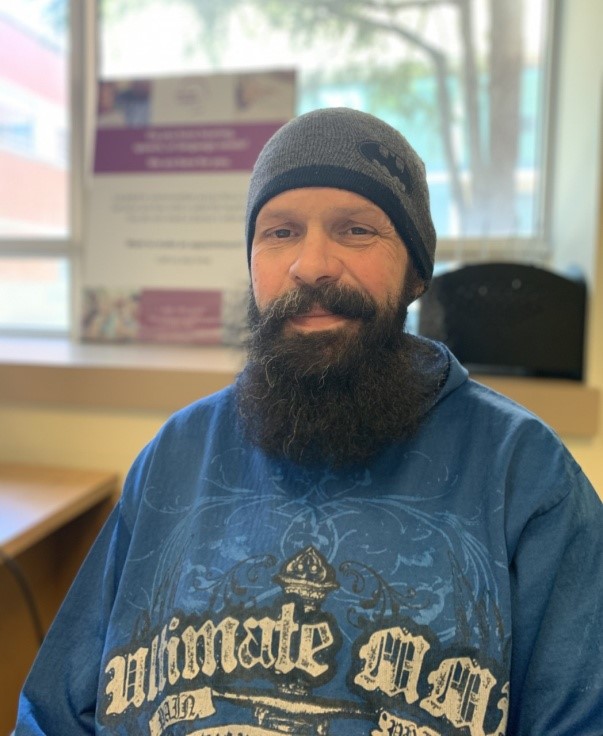June is Brain Injury Awareness Month. Every year there are close to 17,000 brain injuries in Nova Scotia. At HSNS, our staff of SLPs, audiologists and CDTs are trained to help people who have suffered brain injuries with their communication, hearing, and swallowing needs. Quinn suffered a stroke in 2020 and has worked with HSNS staff as both an inpatient and an outpatient. Find out more about Quinn’s story, and the role HSNS has played in his recovery here:
Brain injury affects approximately 1.5 million Canadians and over 70,000 Nova Scotians. Every year, there are close to 17,000 brain injuries in Nova Scotia. There are two types of brain injuries: traumatic brain injury (TBI) and non-traumatic acquired brain injury (ABI). A TBI is caused by an outside event resulting in a blow or bump to the head, like from a motor vehicle accident or a fall. An ABI is caused by something inside the body like a stroke or brain tumour. A brain injury can cause physical, cognitive, behavioural, and emotional changes. Brain injuries can also impact a person’s ability to communicate. They may have difficulty finding words, slurred speech, and changes in their voice. It can also impact a person’s hearing and swallowing abilities. It may also affect the person’s ability to take turns in conversation, stay on topic, and to avoid inappropriate language. At Hearing and Speech Nova Scotia (HSNS), our Speech-Language Pathologists (SLPs), Audiologists, and Communication Disorders Technicians (CDTs) help people who have suffered brain injuries with their communication, hearing, and swallowing needs. (Brain Injury Association of Nova Scotia, 2022).
 This is Quinn’s story: Quinn is a 44 year old man who had a stroke in July 2020. The stroke caused an Acquired Brain Injury that impacted many areas of Quinn’s life. One of those areas was his ability to communicate. Quinn has apraxia of speech and aphasia. Apraxia of speech is a motor speech disorder that makes it difficult to program and plan your speech movements; this can make your speech difficult to understand. Aphasia is a communication disorder that can make it difficult to get your words out, or to understand words that others are saying.
This is Quinn’s story: Quinn is a 44 year old man who had a stroke in July 2020. The stroke caused an Acquired Brain Injury that impacted many areas of Quinn’s life. One of those areas was his ability to communicate. Quinn has apraxia of speech and aphasia. Apraxia of speech is a motor speech disorder that makes it difficult to program and plan your speech movements; this can make your speech difficult to understand. Aphasia is a communication disorder that can make it difficult to get your words out, or to understand words that others are saying.
Quinn began receiving services from Hearing and Speech Nova Scotia as an inpatient, immediately after his stroke. He then continued to be work with HSNS at the Nova Scotia Rehabilitation Centre as part of his recovery. When he was discharged from the Rehab Centre, Quinn began outpatient speech and language services, first at our Dartmouth site, and then at our Kentville site when he moved to his current home in the Annapolis Valley. Quinn has been receiving services from HSNS for almost two years.
Although Quinn has some challenges as a result of his ABI, he doesn’t let that stop him. He is a proud, single father of three children. He works hard on his physical and communication rehabilitation so he can be the best Dad for his kids. Quinn wants you to know that through his work with HSNS he feels his “speech is getting much better”.
Thanks to Quinn for sharing his story and HSNS SLP's Amy Smith and Alanna Veniot for this article.
Please see the Brain Injury Association of Nova Scotia’s website for resources, programs, and upcoming events, such a the Between Two Brains podcast and yoga for ABI: https://braininjuryns.com/about-brain-injury/
American Speech-Language-Hearing Association (n.d.). Traumatic Brain Injury in Adults (Practice Portal). Retrieved May 3, 2022, from www.asha.org/Practice-Portal/Clinical-Topics/Traumatic-Brain-Injury-in-Adults/.